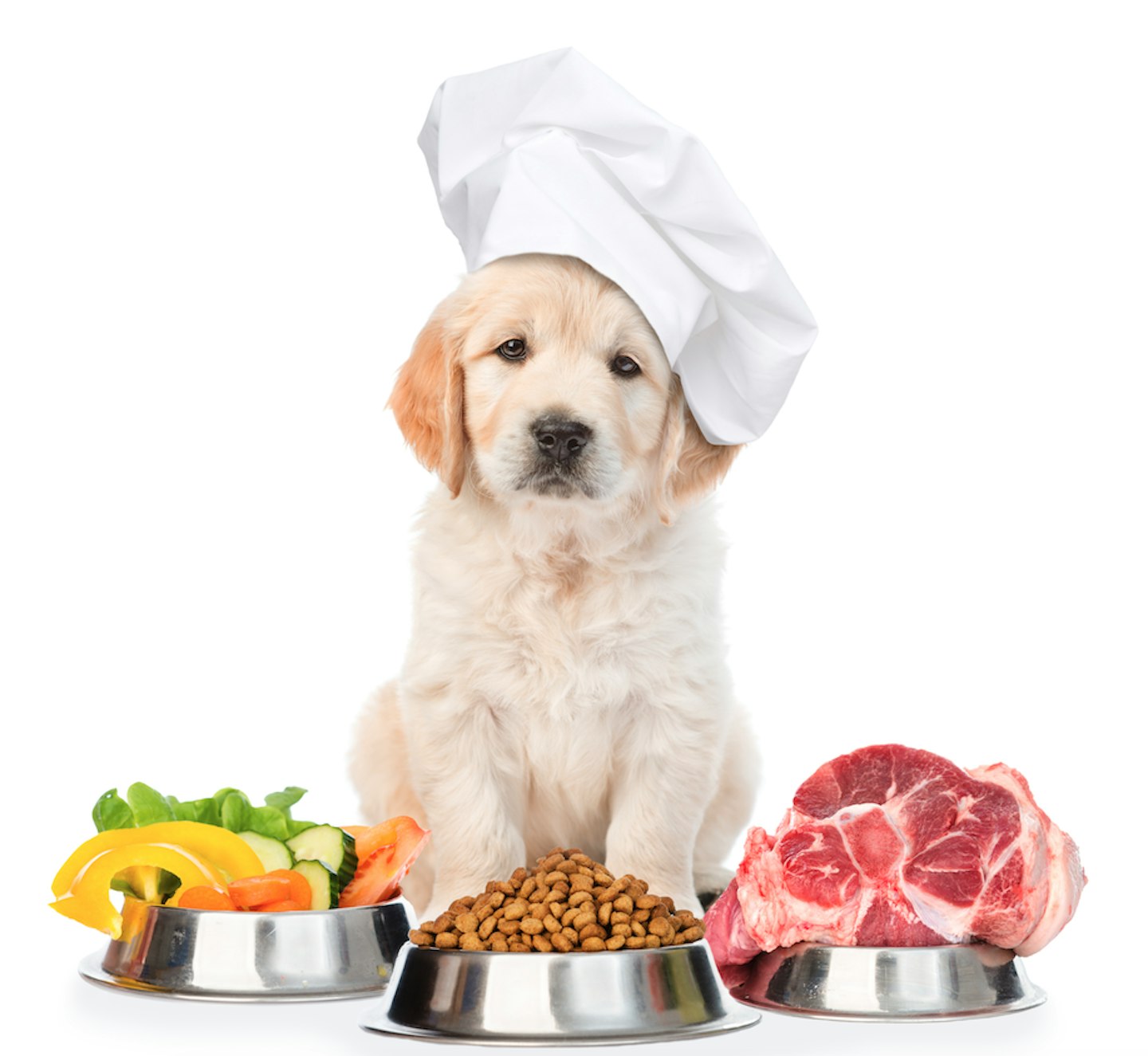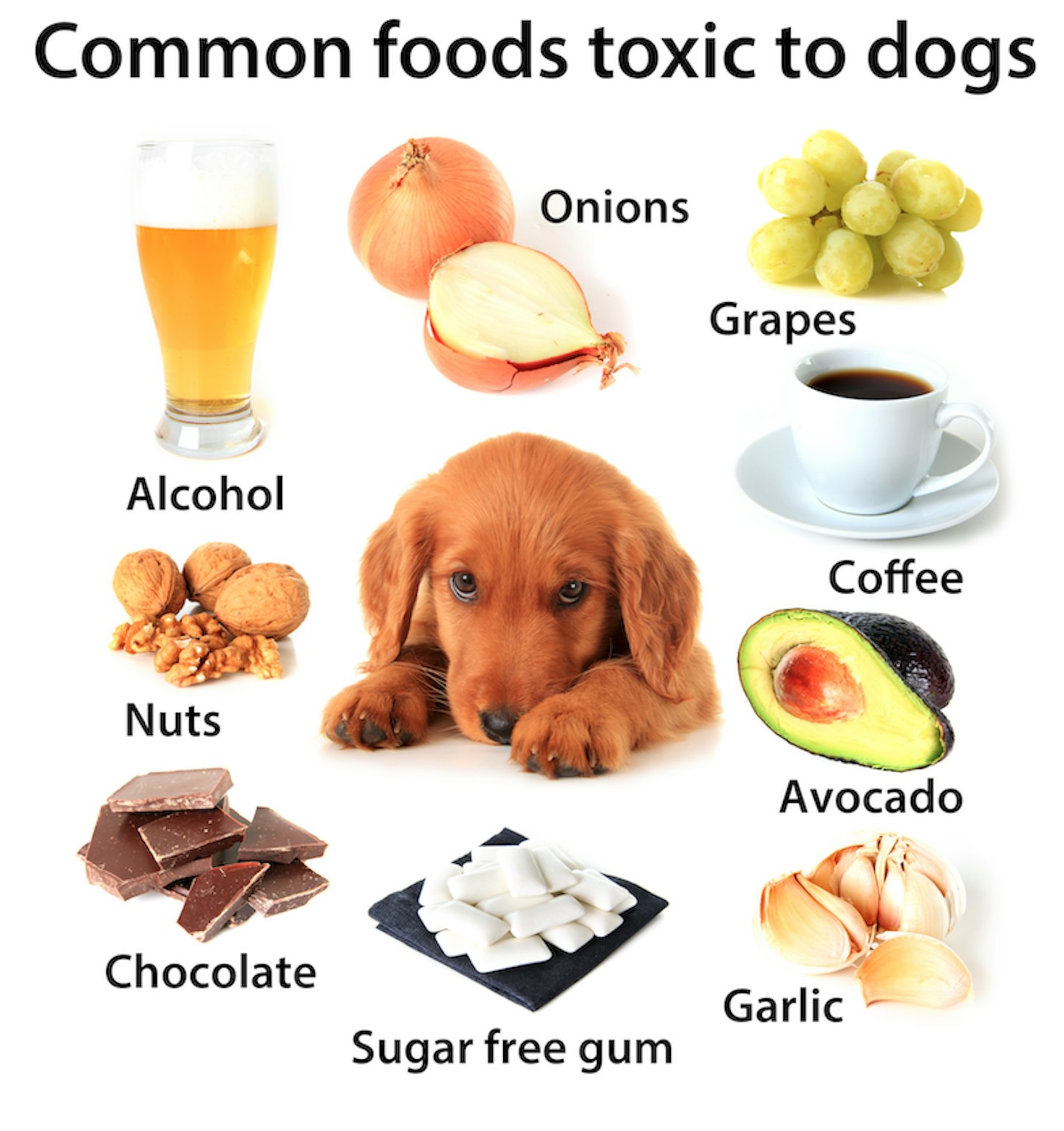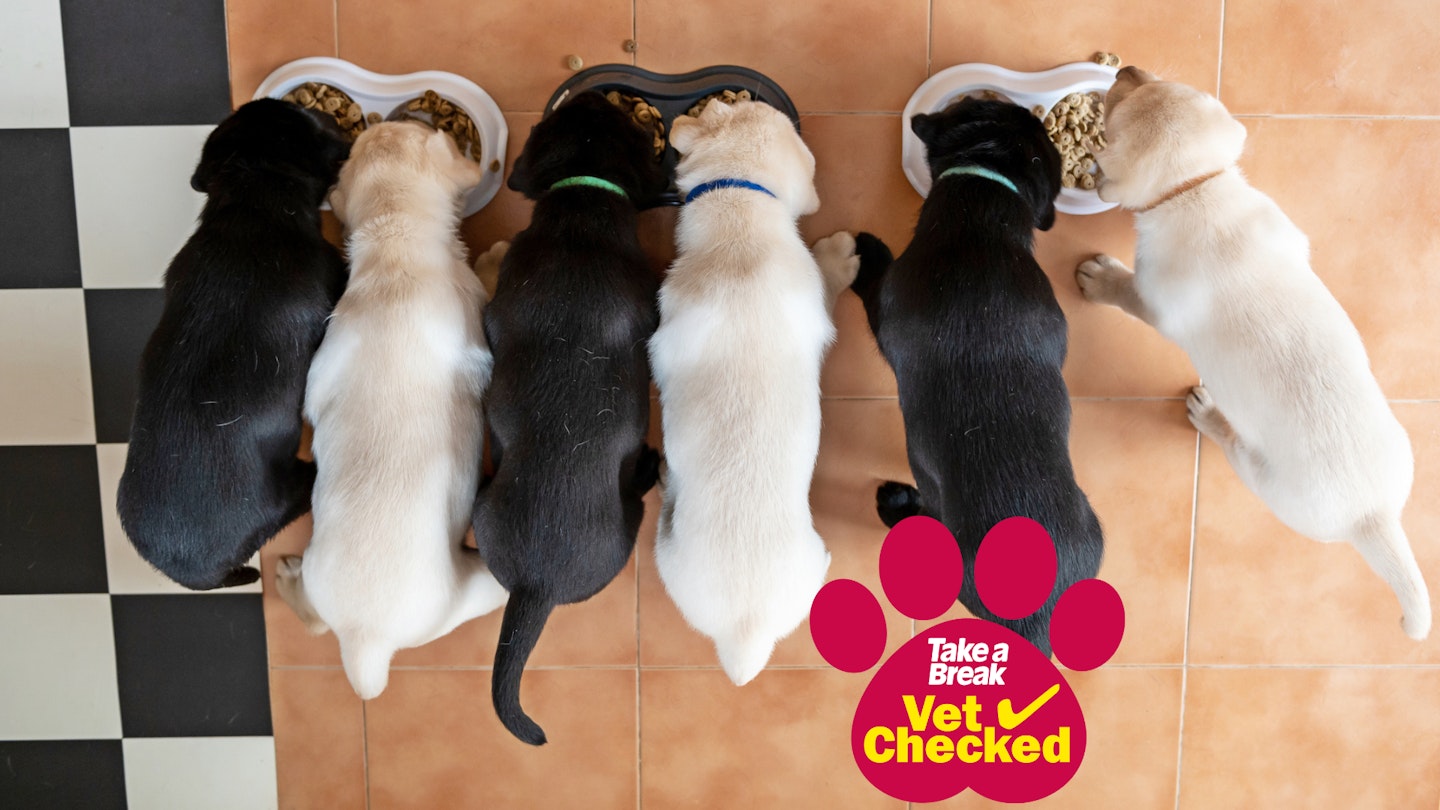Before bringing your puppy home, two questions you’ll need to answer are: What food should I feed my puppy? And how much food should I feed my puppy? Your new furry friend should always have access to plenty of fresh water, but what and how much to feed your puppy is more involved. How much puppy food you feed your pup depends on factors such as their breed, age and size.
Below, with the help of Blue Cross vet, Anna Ewers Clark, we offer guidance on how to choose your puppy’s food, how much food you should feed your puppy and answer your frequently asked questions.
After reading, you’ll be equipped to make the best food choices for your precious pup!

What food should I feed my puppy?
Welcoming a puppy into the family is a big decision, and potential pup parents should research beforehand to know if their four-legged friend is coming from a reputable breeder or rescue centre.
Before you collect your puppy, find out what your puppy’s current diet is (by eight weeks old puppies should be eating solid food). Generally, it is recommended to keep them on the same food, at least until they’ve successfully transitioned into their new home. If you do then decide to change their food, gradually do this over ten days so as not to give them an upset stomach.
The choice of what to feed a puppy and the amount of puppy food available can seem overwhelming. Whether you’re feeding a wet puppy food diet, dry diet, or a mixture of both, ensure the food you pick is suitable for your puppy’s age. Puppies are energetic and grow rapidly, so need food formulated especially for them. This can contain more calories, protein and other nutrients compared with regular adult dog food. The food you buy your puppy should also be described as 'complete' as this means it is nutritionally balanced for your pup.
Should I feed my puppy wet or dry food?
Unless your vet has advised a specific diet for your pet, for example, a special food for puppies with sensitive stomachs, choosing whether to feed wet puppy food or dry puppy food is yours and your puppy’s choice and both have pros and cons.
While wet food is generally more appealing to puppies it spoils much more quickly and is more difficult to store. Meanwhile, dry puppy food can be left out for longer and is more beneficial for your dog’s teeth and gums. However, it is less hydrating.

Should I feed my puppy a home-cooked or raw diet?
It is not recommended to feed a home-cooked diet to puppies up to 18 months of age, as they are very sensitive to nutritional imbalances. Raw food prepared at home is not recommended for the same reason.
There are pre-prepared raw puppy foods available, that often come frozen, which reduces the risk of bacteria being spread throughout the home compared to preparing raw food yourself and of the food being nutritionally unbalanced.
Raw diets are becoming increasingly popular for puppies and dogs, but there are drawbacks and many vets don’t recommend them. If you are thinking of putting your puppy on a raw diet or are simply unsure whether your pup is eating the right food, speak to your vet for advice.
How much should I feed my puppy?
How much you feed your puppy depends on factors such as how old is your puppy, how big is your puppy, and how active they are.
A good place to start is with the guides present on the food packaging you feed your puppy. Use that as a basis, then use scales to measure out the correct portion (the guides usually show the recommended daily amount, so that figure should be divided by how many meals your puppy has each day).
Then monitor your puppy’s body condition closely so you can adjust their diet accordingly. For instance, if they’re putting on too much weight, reduce the amount you feed them slightly and monitor (and vice versa).
FAQs
Below, Anna Ewers Clark, lead vet at Blue Cross, answers your frequently asked questions about your puppy’s diet…

What food is best for a puppy?
Puppies grow rapidly, so have different nutritional needs to adult dogs. I recommend feeding your pup a high quality, complete puppy food until they are around a year old (or as advised by your vet) before moving them on to an adult food.
Your vet may recommend feeding a giant or large breed puppy food for longer than a year.
How do I know if I’m feeding my puppy enough?
The best way to know if you’re feeding your puppy enough is to weigh them regularly to check they are growing at a normal rate.
You can also check their body shape to see if they could be over or underweight. You should be able to feel their ribs and spine as you stroke them, but their rib cage shouldn’t be sticking out.
If you have any concerns or you’re not sure how much food your puppy needs, talk to your vet for advice.
Is two meals a day enough for a puppy?
It’s best to feed your puppy four meals a day. At four months, this can be reduced to three meals each day, and then two a day when they turn six months.
I recommend continuing a morning and evening meal for your pup's life.
What is the best time to feed a puppy?
When you choose to feed your pup their meals is up to you, but we recommend spacing out meals evenly throughout the day. Giving them a stable routine will make life easier for you and them.
When do you switch a puppy to dog food?
Feed your puppy a labelled puppy food until they reach at least a year old, or as advised by your vet, before changing to adult food.
What human foods can puppies eat?
Puppies can eat some human foods including boneless cooked meat, fish or vegetables but they should be fed as a treat only.
It isn’t easy to get the correct balance of nutrients for your pup if you’re only feeding them human food, so it’s safest to choose a high-quality, complete pet food for their main food.
What human foods are poisonous to puppies?
Foods including chocolate, onions, raisins and grapes can cause serious poisoning, as can sugar-free products, such as chewing gum, which contain the sweetener Xylitol.
Contact your vet if you think your pet may have eaten any of these foods.

Can puppies eat adult dog food?
It’s important to feed your pet a diet that’s suitable for their life stage. As puppies are growing, they have different nutritional requirements to adult dogs.
A one-off meal isn’t a concern but feeding a puppy an adult dog food diet long term could lead to health problems.
What should I do if my puppy is vomiting undigested food?
If your puppy is vomiting or bringing up undigested food, it’s important to get them checked by your vet. This is especially important if they’re vomiting after every meal, losing weight or showing any other signs of illness.
This article contains expert advice from Anna Ewers Clark, lead vet at Blue Cross, a charity that finds homes for abandoned or unwanted pets and keeps pets healthy by promoting welfare and providing veterinary treatment. Since graduating from the Royal Veterinary College in 2015 she has worked in small animal veterinary practices in both the charity and private sector. She also has a degree in Animal Behaviour and Welfare. Anna lives with her dogs, Kirk and Jerry, and two rescue rabbits, Jack and Harley.
Joe Brothwell is editor of Take a Break Pets and adores all creatures great and small. Despite being a doting cat dad to Winnie, she continues to be aloof!
